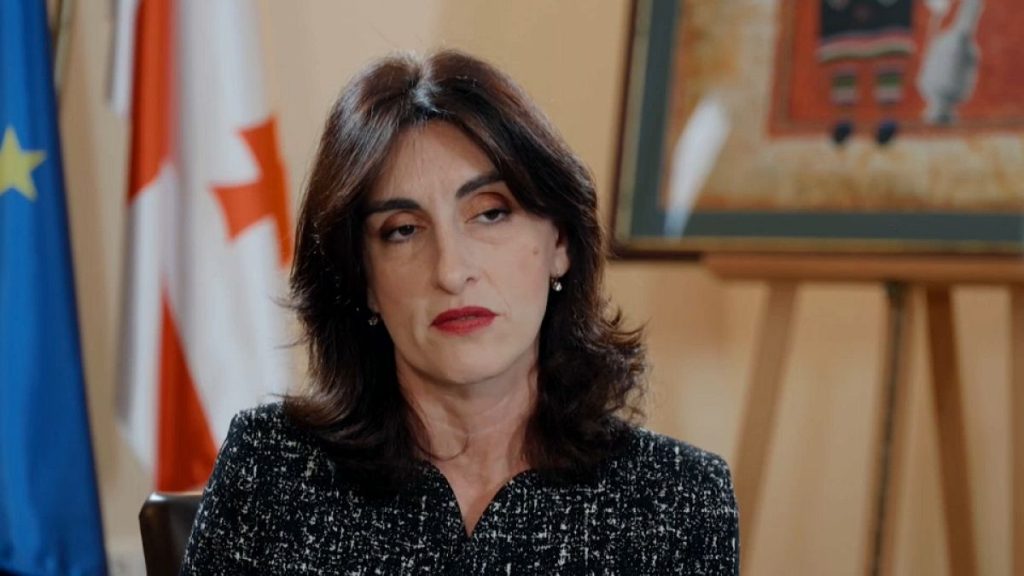Paragraph 1: The Genesis of the Protests
Large-scale protests erupted in Georgia following the ruling Georgian Dream party’s decision in late November 2024 to suspend the country’s European Union accession talks until 2028. This move ignited public discontent as a significant portion of the Georgian population strongly supports joining the EU. The protests, now entering their third week, reflect the deep-seated aspiration among many Georgians for closer ties with Europe and integration into the EU framework. The government’s decision to postpone negotiations has been met with widespread disapproval, prompting thousands to take to the streets to voice their opposition.
Paragraph 2: Escalating Tensions and Police Response
The demonstrations, initially peaceful, have seen an escalation in tensions and clashes between protesters and law enforcement. Police have responded with increasingly forceful tactics, employing water cannons, tear gas, and other measures to disperse the crowds. Over 300 protesters, including opposition leaders and activists, have been detained, and more than 100 have received medical treatment for injuries. The police response has drawn sharp criticism from human rights organizations and international observers, with concerns raised about excessive force and potential violations of fundamental rights.
Paragraph 3: Allegations of Police Brutality and International Condemnation
Georgia’s public ombudsman has leveled serious accusations against the police, describing the violence used against protesters as torture and brutality. The ombudsman’s statement pointed to the nature and location of injuries sustained by protesters as evidence of intentional and excessive force used as a form of punishment. This accusation aligns with concerns expressed by Volker Türk, the UN’s High Commissioner for Human Rights, who characterized the use of force against demonstrators as "extremely worrying." These pronouncements from both domestic and international bodies underscore the gravity of the situation and the potential for further escalation.
Paragraph 4: The Government’s Justification and Counter-Accusations
Georgia’s new Foreign Minister, Maka Botchorishvili, in an exclusive interview with Euronews, defended the police crackdown, attributing it to the presence of violent groups within the protests who specifically targeted police officers. While acknowledging the right to peaceful protest, Botchorishvili emphasized that the demonstrations had been marred by violence, citing the use of fireworks and attacks on police, resulting in injuries to over 200 officers, some critically. She stated that any excessive use of force by police would be investigated, echoing the Prime Minister’s commitment to accountability. However, her framing of the protests as inherently violent contrasts sharply with the narrative presented by protesters and human rights organizations.
Paragraph 5: The Backdrop of EU Accession and Political Dynamics
The protests unfold against the backdrop of Georgia’s complex relationship with the EU and its internal political dynamics. The European Parliament’s critical resolution following the October 2024 elections, which voiced concerns about “democratic backsliding” in Georgia, likely contributed to the government’s decision to pause EU accession talks. The ruling Georgian Dream party’s securing of a parliamentary majority in the October elections may have emboldened them to take this step despite widespread public support for EU membership. Georgia’s formal application for EU membership in March 2022, following Russia’s invasion of Ukraine, and subsequent grant of candidate status in December 2023, had generated significant optimism among Georgians. However, the European Council’s decision to halt the process in the summer of 2024, due to concerns over Georgia’s controversial foreign influence law, created a setback in the country’s path towards EU integration.
Paragraph 6: Denial of Pro-Russian Tilt and Reaffirmation of EU Commitment
Foreign Minister Botchorishvili refuted allegations that the Georgian government is turning away from the EU and aligning itself with Russia. She rejected the simplistic "black or white" portrayal of the situation, arguing that the Georgian Dream party’s 12-year rule demonstrates no pro-Russian actions. She highlighted Georgia’s support for Ukraine and the 2014 Association Agreement with the EU as evidence of the country’s commitment to European integration. Botchorishvili emphasized Georgia’s consistent demonstration of shared values with its European partners over the past decade, attempting to reassure the EU of Georgia’s continued commitment to the accession process despite the current political turmoil and the controversial pause in negotiations.

